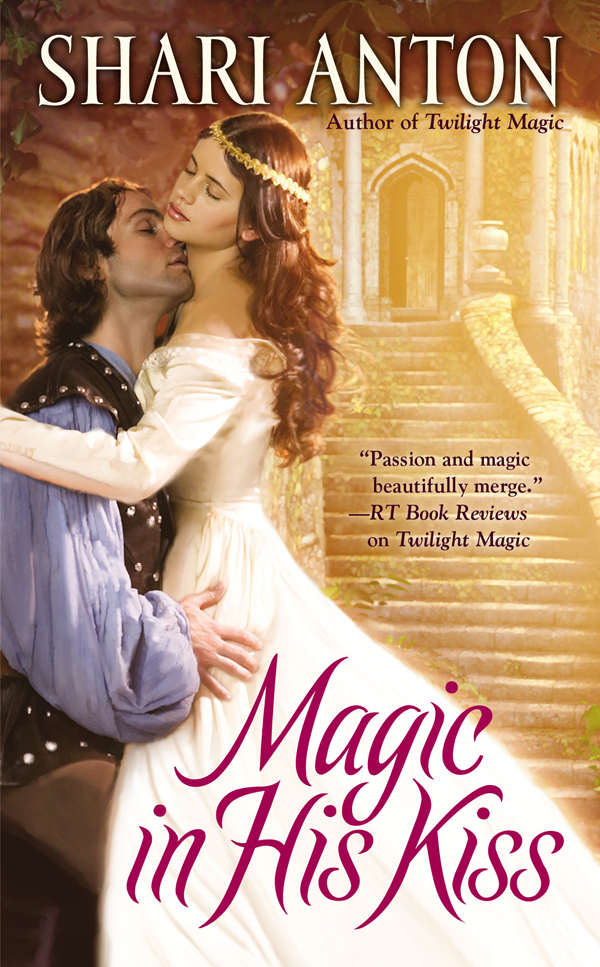Magic in His Kiss



In accordance with the U.S. Copyright Act of 1976, the scanning, uploading, and electronic sharing of any part of this book without the permission of the publisher constitute unlawful piracy and theft of the author’s intellectual property. If you would like to use material from the book (other than for review purposes), prior written permission must be obtained by contacting the publisher at [email protected]. Thank you for your support of the author’s rights.
To Denise and Ronald,
around whom center a mother’s deepest
sorrows, greatest joys, inevitable regrets, and everlasting
pride. Love you, my darlings!
Wales, August 1153
R
hodri ap Dafydd skillfully wielded two weapons in the service of Connor ap Maelgwn, chieftain of Glenvair.
During supper, Rhodri had brandished the first one, his weapon of choice: his harp. To lift the gloom caused by grim news from England, he’d sung the praises of the Welsh princes who, after years of fighting, had reclaimed the Welsh lands once conquered by England’s hated Marcher earls.
Now he sat cross-legged on the hard-packed earthen floor, tending the other, deadlier weapon. Within the central fire pit’s flickering glow, Rhodri slid a whetstone along the edge of his sword, preparing for the possibility of gruesome battle with those same earls.
Connor paced a path in the manor’s dirt floor and slapped the rolled parchment containing the bad news against his leg.
“If it is true that King Stephen’s heir is dead,” Connor said, “he may succumb to the earls’ demands to bargain for peace with Henry Plantagenet.” He halted and stared intently at Rhodri. “England at peace
always
means strife for Wales. Better for us if the damn earls remain divided in their loyalties between Maud and Stephen, continue to fight among themselves, and leave us be!”
As the earls had done for the past few years. Empress Maud and King Stephen had waged a fine war over England’s throne, occupying their supporters with attacking and defending against each other, giving the earls no time or resources with which to harass Wales. If Stephen named Henry Plantagenet, Maud’s son, as his heir, peace might soon follow.
And Connor had the right of it. England at peace always meant strife for Wales. Worse, Henry was said to be as ambitious and forceful as his royal maternal grandsire, for whom he’d been named, and during whose reign Wales had suffered mightily. Since most of the Marcher earls had rebelled against Stephen to fight for Maud, they’d happily follow Henry wherever he led them, especially into Wales.
Connor waved the parchment scroll like a sword, as if he signaled a charge into the enemy’s heart. “The Welsh princes must unite! If they do not, we may all perish.”
Rhodri’s gut knotted. During his apprenticeship to one of the most accomplished bards in the land, Rhodri had committed to memory the history of Wales, all the way back to ancient times. Rarely had the princes banded together under one leader to stave off invasions.
Rhodri pointed out the obvious. “Each prince has his ambitions for expanding his own lands. For them to unite for a common cause might require a miracle. Have you one at the ready?”
Connor sighed and eased down onto a nearby stool, placing his deeply wrinkled hands on his knees. White hair revealed his advanced years; a furrowed brow bespoke a troubled mind. Still, vigor and intelligence lit the chieftain’s amber eyes, belying any belief that his mind might wither with age.
“No ready miracles,” Connor admitted. “However, we may have time to conjure one. Even if Stephen names Henry as his heir, the lad will have to wait until Stephen dies to claim England’s crown.”
Rhodri scoffed. “We could both name several young men who sent fathers, uncles, and brothers to their graves before their natural life’s end. Ambitious men tend to impatience when a great prize is within reach.”
Henry Plantagenet, duke of Normandy and Aquitaine, count of Anjou, Touraine, and Maine, wasn’t known for his patience.
Nor were the Marcher earls. They eagerly awaited the chance to punish the imprudent princes for believing Wales should be ruled by the Welsh.
Rhodri ran a thumb along his sword’s edge, quite willing to cut down any Englishman who dared to attack Glenvair. “’Tis not Henry who is the immediate threat. If peace comes to England, the earls of the March will once again turn their thoughts toward Wales. Whether the princes unite or no, we will defend Glenvair, as we have always done.”
“That we will,” Connor stated firmly, then leaned forward, elbows on knees. “I am of a mind, however, to gain an advantage.” He again waved the rolled parchment. “Though Gwendolyn kindly informs me of whatever news she hears of affairs in England, I wish to heaven above that when she and her sisters were orphaned, I had gone to Camelen to fetch my nieces and bring them to Glenvair. That mistake must now be made right!”
Rhodri couldn’t see any advantage to Connor interfering with his long-dead sister Lydia’s girls at this late date. Rhodri well remembered the day Connor received word that his Norman brother-by-marriage, Sir Hugh de Leon, along with his son, William, had died fighting for Empress Maud. The three orphaned de Leon girls had become wards of King Stephen.
Emma had been sent to King Stephen’s court, where she’d been forced to marry Darian of Bruges, a Flemish mercenary. Gwendolyn had been forced to marry Alberic, the unacknowledged bastard son of one of the most hated of the Marcher lords—the earl of Chester. Nicole had been given to the Church and, as far as Rhodri knew, still resided in Bledloe Abbey, awaiting whatever fate King Stephen decided for her.
“The girls were out of your reach then, as they are now.”
“Gwendolyn and Emma, perhaps, but not Nicole. Stephen holds her captive in Bledloe Abbey. He intends to wed her to a Welsh noble, preferably to a prince. Such a marriage would forge an alliance between the prince and English crown, possibly driving another wedge between the remaining princes. We must remove that weapon from Stephen’s armory and use it to our own advantage.”
Rhodri assumed Connor entertained his own notion of which high-born Welsh noble Nicole should marry. But for Connor to have any say in the matter of Nicole’s marriage meant removing her from Bledloe Abbey, then quickly marrying her off to the man of Connor’s choice. A good strategy, but he foresaw problems in the execution of such a plan.
To mount a raid on the abbey, located near Oxford, in the heart of England, might prove a disaster.
Connor ap Maelgwn was a cunning chieftain, a ferocious soldier, and—usually—an honorable man. How much was he willing to risk to wrest his youngest niece from English control?
“Kidnapping Nicole might be considered an act of war. And what of her sisters? Emma and Gwendolyn might not approve of your scheme, and their husbands would make formidable opponents.”
Connor acknowledged Rhodri’s concerns with a nod, saying, “I believe that, for a time, England’s lords will be more concerned with the fate of the crown than with other matters. As for Nicole’s sisters, I believe they will see that I act for other than selfish reasons. After all, our family’s heritage must be preserved. The tree of Pendragon
must
bear a Welsh branch to remain strong.”
Pendragon.
The bloodline of King Arthur.
Rhodri knew every word of the ancient legends, could sing the tales of Arthur’s conquests and his downfall. That revered bloodline flowed through the family of ap Maelgwn.
He’d been a young lad when his widowed father had become betrothed to Connor’s younger sister. To everyone’s sorrow, before the marriage could take place, the couple had drowned in the Severn. Connor had been kind enough to feed and shelter an orphaned boy.
Though Rhodri had been grateful for Connor’s aid, he’d also felt insignificant, like a blade of grass within the mighty oak’s shade.
’Twas one of the reasons he’d apprenticed for eight years with Cynddelw Brydydd Mawr, the acclaimed
pencerdd
to the prince of Powys, to become a bard like his father.
One day he would seize the opportunity to earn his chair and advance to the honored position of
pencerdd
to a Welsh prince. But until one of the princes held a contest to choose a new
pencerdd,
Rhodri could do little to advance in his profession. And at the moment, his duty as
bardd teulu
of Glenvair was to counsel Connor.
“You cannot march a band of Welshmen across half of England without drawing the enemy’s attention. The raid would certainly fail.”
“True, which is why I propose to send one man.”
From the directness of Connor’s stare, Rhodri knew whom he intended to send.
The prospect both excited and disturbed him. He was honored by Connor’s faith and trust in him, and success would surely bring rewards—from both Connor and whichever noble he’d chosen for Nicole to marry.
Rhodri also foresaw problems. He wasn’t one of Nicole’s favorite people, as Connor well knew.
“You want
me
to kidnap Nicole out of Bledloe Abbey and bring her to Glenvair?”
“Better if Nicole comes to me of her own free will. You are one of the most persuasive men I know. Charm her with praises to her beauty. Remind her of her glorious lineage. Talk to her, Rhodri! Do whatever you must to convince her that coming to Wales is the best course for her and for her family’s heritage.”
“She does not like me. She may not listen.”
Connor waved a dismissive hand. “Nicole was no more than a handful of years old when she was last here. Surely she is no longer a spoiled child but a mature woman and can now be reasoned with.” Then his eyes narrowed. “And if reasoning fails, bring her anyway. The matter of her marriage is too important to me and to Wales to entrust to the English king.”
Connor rose and strode off, leaving Rhodri to ponder how he might accomplish this difficult task.
Talk to her, Connor had said.
Rhodri dismissed attempting to appeal to her vanity, which Nicole most certainly possessed, in favor of the more practical course.
Could an appeal to Nicole’s sense of duty to her Pendragon heritage have the desired effect? Perhaps, if she felt a sense of duty. Problem was, the Nicole de Leon he remembered cared only for her own concerns. A spoiled, headstrong imp of a princess who struck out physically when displeased.
Rhodri ap Dafydd rubbed his leg, remembering his last encounter with Nicole de Leon, fearing this time she might do far worse than kick his shin, the act of a petulant princess for which
he’d
been severely punished.
Perhaps Connor had the right of it. Surely Nicole’s eight years in a convent had mellowed her temper and taught her humility. As a full-grown woman, maybe now Nicole could be reasoned with.
And if not, he now knew better how to guard against a kick in the shins.
Your time here is done, Nicole. Come out.
Nicole de Leon bolted upright on her narrow cot, her eyes snapping open in the night-shrouded dormitory.
